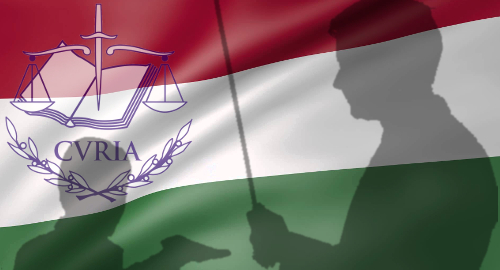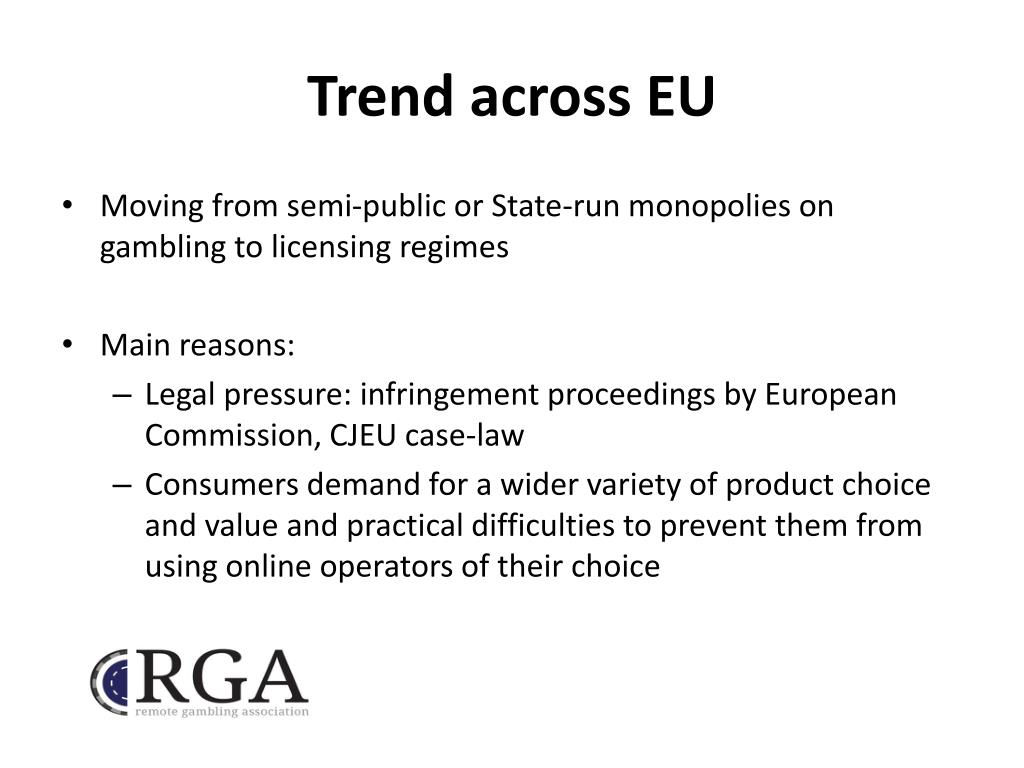Eu Gambling Case Law



Gambling is defined in numerous ways, but requires betting or wagering on an outcome that is at least partially based on chance, and done so in order to win something. Illegal gambling is any type of gambling that is specifically prohibited by state law. Gambling Involves a Bet. Gambling case law European Commission work in the field of online gambling services The Commission supports EU countries’ efforts to modernise their national online gambling legal frameworks, in particular in the framework of administrative cooperation between gambling regulatory authorities. Last 30th June another remarkable judgment on the matter of online gambling was delivered by the European Court of Justice. The case (C-212/08, Zeturf Ltd v. Premier ministre) involved a Maltese company offering gambling services via the Internet. Learn about EU Gambling Legislation and current state of affairs in this field. The gambling legality is an issue of great complexity. Each of twenty-seven member countries decides for itself whether to give gambling a legal status. Several EU countries outlawed all types of online gambling, others legalized it and reap tax revenues from this profitable business, but for the majority online.
Eu Gambling Case Lawyers
The gambling legality is an issue of great complexity. Each of twenty-seven member countries decides for itself whether to give gambling a legal status. Several EU countries outlawed all types of online gambling, others legalized it and reap tax revenues from this profitable business, but for the majority online gambling remains in a grey area of the law - neither legal nor illegal.
EU Gambling Laws and Regulations
European Union officials have pro-gambling position, the majority of EU member states do not prohibit online gambling, on the contrary it is regulated and taxed. The EU countries are unable to impose a ban on the online gambling because this will run counter to EU law which must feature conformity across the EU but still at least 10 member states have opted to enact local legislation banning online gambling (for example, France and Germany).
Nowadays online casinos attract sustained interest in European countries. Norway, Germany, Austria, Sweden, Denmark and Ireland undergo the highest growth in terms of online casino creation. Of course, European countries oblige online casinos to obtain licenses and impose specific rules about online gambling activities. In the Netherlands online casinos are legal but the Dutch Gaming Act allows the Dutch to gamble at the casinos that have a Dutch lincense.

To cut a long story short, online gambling is generally legal in Europe, nevertheless we strongly recommend you to find out more about the attitude of the government of your country towards online gambling before playing online. We remind you the information presented should not be treated as a legal advice but we sincerely hope that it will be of use to you.
Germany | Germany banned all forms of online gambling except for horse racing by 2011 with The German Interstate Treaty on Gambling signed in 2008. EU considers such legislation illegal as Germany allows state-owned online gambling but restricts foreign competition. This ban is threatened as this type of legislation needs all 16 states in Germany to support the law. One of the states recently stated its opposition to this legislation. |
| Italy is the second member state of EU to legalize online gambling namely online casinos, poker rooms, sports betting operators and online bingo halls. Together with the toleration of legal online gambling, comes a strong focus on battling and dismantling illegal gambling operators. | |
France | In France online gambling and thus all games of chance are prohibited. There is a tentative goal to open France's online gambling market to competitors by January 1st, 2010 and license online gambling operators which offer sporting bets, horse racing and poker and it has already been approved by MPs in the National Assembly. French legislators are discussing a bill that would end a state monopoly on online gambling. The proposed law allows web companies to obtain a license to operate in France, even if they already hold licenses in other EU countries. Currently, Française des Jeux, PMU and casinos can legally offer gambling services. |
| UK was the first member country to legalize online gambling. The Gambling Act of 2005 allows UK residents to gamble online, and gave online gambling operators the ability to apply for licenses given out by the state. | |
Spain | Spanish Ministry of Interior announced that online gambling legislation would soon be completed and presented in January 2010. The legalization of a collectively regulated online gambling market is closer than ever, and international gambling giants are ready to integrate into massive Spanish gambling market. |
Disclaimer
CasinosDoc is not a legal authority. We remind you the information presented should not be treated as a legal advice but we sincerely hope that it will be of use to you. To get accurate information or advice on online gambling, consult the laws of the country where you reside or jurisdiction in which you are playing.
The EGBA (European Gambling and Betting Association) is calling for new EU gambling laws to better protect players. It comes at a time when many different European nations are struggling to lower gambling addiction rates. Hope is that, with better laws, problem gambling rates around the continent will go down.
This also comes at a time when many EU nations take to the polls to vote for new leaders. Today, we’re going to look into why the EGBA is calling for new gambling regulations. Later, we’ll take a look at whether or not EU gaming laws will be changed this year.
Why Is the EGBA Pushing for New Regulations?
It’s not much of a surprise to see Europe’s primary gambling regulator calling for new laws. Over the past several years, many different countries here have opened their gaming industries to foreign companies. Sweden, Croatia, and Spain have all allowed new companies into their online gambling markets.
Unfortunately, this has led to a significant increase in gambling addiction rates. Even countries that have allowed online gambling for years are seeing problem gambling numbers go up. The UK, for instance, is said to be home to more than 400,000 gambling addicts.
Many of these countries are now beginning to combat these issues. Ireland is currently reviewing a completely new set of gaming laws. In April, the UK announced a new “National Strategy” to lower gambling addiction around the country, as well.
It’s great to see different countries work on this increasingly common issue. The EGBA is arguing that new EU gambling laws will make this process even easier. Will this group’s plans be put into effect this year?
What Is the EGBA Asking For?
This gambling regulatory body is now calling on officials to increase regulations on Europe’s online gambling industry. Heads of this group want to see the European Parliament set new EU gambling laws that will ensure all gaming companies protect players. As we just mentioned, this comes at a time when Europe’s problem gambling rates are higher than ever.
Eu Gambling Case Laws
The EGBA claims that online gambling now makes up more than 20% of the entire EU gambling market. A lack of common EU laws on this industry is hurting players, they argue. This makes sense, as almost every country has its own unique set of online gambling laws and regulations.
The EGBA feels this is a major issue right now. The group claims that there are
“significant disparities in the quality of these national regulations.”
A number of studies prove this assessment to be correct.
Maarten Haijer, secretary general of the EGBA, fully supports new EU gambling regulations:
“In 2019, there’s no reason why online gamblers living in one member country should be less protected than those living in another—but they are.”
He also said,
“That’s why EGBA is calling for common EU rules and better regulatory cooperation to ensure a more consistent and better standard of protection for all Europe’s online gamblers.”
Will the European Parliament Agree to Implement New EU Gambling Laws?
It’s hard to say. The EU is currently working to make a deal with the UK over Brexit. Unfortunately, the idea of creating new EU gambling laws is probably low on the list of priorities.
The EGBA is making a compelling case, though. The fact that nearly every European country has its own set of online gambling laws makes it a very difficult industry to regulate. If the EU Parliament created new laws that all gaming companies would need to abide by, it could potentially lower gambling addiction rates.
Of course, this would probably not go over well with online gambling companies. Most of these companies choose which markets they want to enter based on the regulations. If there was a blanket set of laws across the EU, this would change.
No one knows if the EU Parliament will set new regulations. It may take time before this government body takes action. In the meantime, many countries are doing a great job of tackling the problem gambling issue themselves.
Do you think new EU gambling laws should be set in place? Has a lack of oversight led to the rise in gambling addiction? Let us know in the comment section below!
Please enable JavaScript to view the comments powered by Disqus.